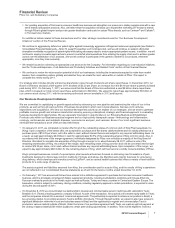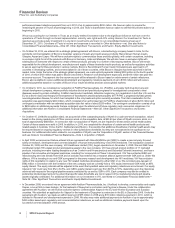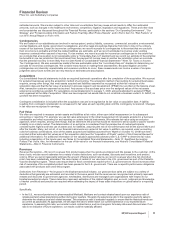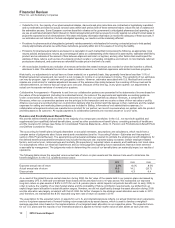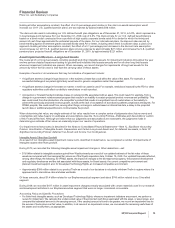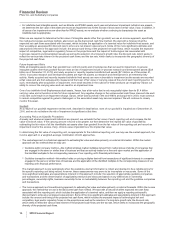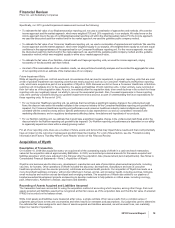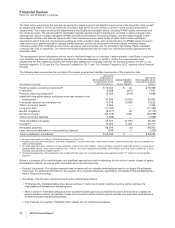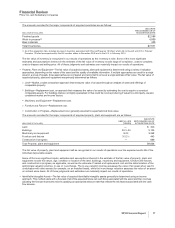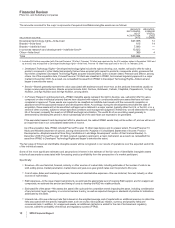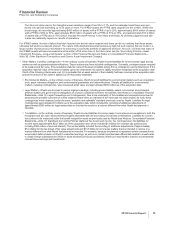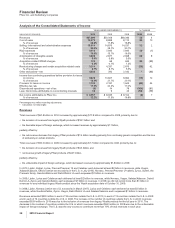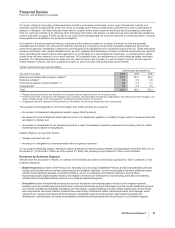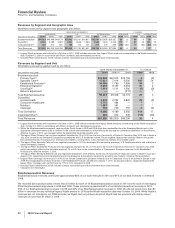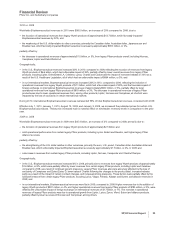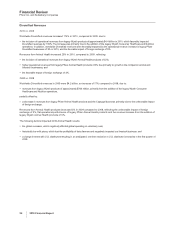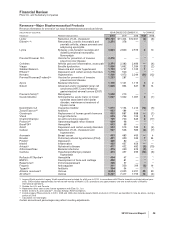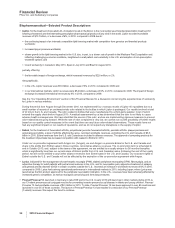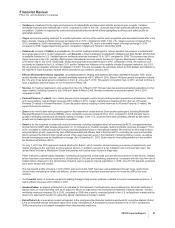Pfizer 2010 Annual Report Download - page 19
Download and view the complete annual report
Please find page 19 of the 2010 Pfizer annual report below. You can navigate through the pages in the report by either clicking on the pages listed below, or by using the keyword search tool below to find specific information within the annual report.
Financial Review
Pfizer Inc. and Subsidiary Companies
The amounts recorded for the major components of acquired inventories are as follows:
(MILLIONS OF DOLLARS)
AMOUNTS
RECOGNIZED AS OF
ACQUISITION DATE
Finished goods $2,596
Work in process(a) 4,969
Raw materials 406
Total Inventories $7,971
(a) As of the acquisition date, includes pre-launch inventory associated with Prevnar/Prevenar 13 Infant, which did not launch until 2010. Prevnar/
Prevenar 13 Infant was approved by the EU member states in December 2009 and in the U.S. in February 2010.
The fair value of inventory is recognized in our results of operations as the inventory is sold. Some of the more significant
estimates and assumptions inherent in the estimate of the fair value of inventory include stage of completion, costs to complete,
costs to dispose and selling price. All of these judgments and estimates can materially impact our results of operations.
•Property, Plant and Equipment—The fair value of acquired property, plant and equipment is determined using a variety of valuation
approaches, depending on the nature of the asset and the quality of available information. If multiple approaches are used for a single
asset or a group of assets, those approaches are compared and reconciled to arrive at a single estimate of fair value. The fair value of
acquired property, plant and equipment was primarily determined as follows:
OLand––Market, a sales comparison approach that measures value of an asset through an analysis of sales and offerings of
comparable property.
OBuildings—Replacement cost, an approach that measures the value of an asset by estimating the cost to acquire or construct
comparable assets. For buildings that are not highly specialized or that could be income producing if leased to a third party, we also
considered market and income factors.
OMachinery and Equipment—Replacement cost.
OFurniture and Fixtures—Replacement cost.
OConstruction in Progress—Replacement cost, generally assumed to equal historical book value.
The amounts recorded for the major components of acquired property, plant and equipment are as follows:
(MILLIONS OF DOLLARS)
USEFUL LIFE
(YEARS)
AMOUNTS
RECOGNIZED AS OF
ACQUISITION DATE
Land — $ 303
Buildings 33
1
⁄
3
-50 5,135
Machinery and equipment 8-20 3,068
Furniture and fixtures 3-12
1
⁄
2
443
Construction in progress —889
Total Property, plant and equipment $9,838
The fair value of property, plant and equipment will be recognized in our results of operations over the expected useful life of the
individual depreciable assets.
Some of the more significant inputs, estimates and assumptions inherent in the estimate of the fair value of property, plant and
equipment include the nature, age, condition or location of the land, buildings, machinery and equipment, furniture and fixtures,
and construction in progress, as applicable, as well as the estimate of market and replacement cost and the determination of the
appropriate valuation premise, in-use or in-exchange. The in-use valuation premise assesses the value of an asset when used in
combination with other assets (for example, on an installed basis), while the in-exchange valuation assesses the value of an asset
on a stand alone basis. All of these judgments and estimates can materially impact our results of operations.
•Identifiable Intangible Assets—The fair value of acquired identifiable intangible assets generally is determined using an income
approach. This method starts with a forecast of all of the expected future net cash flows associated with the asset and then involves
adjusting the forecast to present value by applying an appropriate discount rate that reflects the risk factors associated with the cash
flow streams.
2010 Financial Report 17


